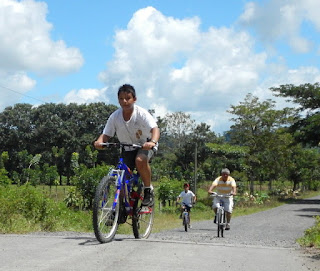Some communities in this remote area can only be accessed by the Telire River. Bikes must be offloaded and reloaded onto small 'pangas' to transport the bikes to the communities where they will help transform lives.
Talamanca is one of six cantons, or counties, located in the province of Limón. It is one of the poorest cantons of Costa Rica; the human development index ranks among the lowest in the country.
Talamanca is home to two of the eight indigenous tribes left in Costa Rica. The Bribri and Cabecar speak their own languages and are mostly isolated from the rest of Costa Rica. Because of the language barriers of these indigenous people, they are often less educated and lack proper health care.
Coroma is one of the most remote villages, located in the mountainous area of Talamanca. Coroma is near Puerto Viejo, a popular tourist beach on the east coast of Costa Rica. Unless the Telire River is extremely low, the only way to access Coroma is by boat.
It is in Coroma where you will find the Bribri, living a modest life, many without clean, running water and some without electricity. A missionary group recently built a school in this area, bringing education two hours closer than ever before.
The Bribri are mostly farmers, providing for their families through fruitful banana and plantain crops. Most of what the community needs, food, herbal medicines, and building materials, is grown right in their village. They supplement those supplies with others purchased from the sale of their crops.
Supplies coming in and out of Coroma must make this trek to and from the Telire River. Our bikes make this journey faster and help farmers transport more bananas and plantains to the boats for sale to larger communities.
Bikes for the World added FINCA Costa Rica as a partner in our first year. This micro-finance project has become known as MiBici and operates much like a monetary loan that is paid back and reinvested in the community.
Bikes that are donated from neighborhoods around the DC area are shipped to coastal communities in Costa Rica where bikes are divvied up among many community groups and then transported all around the country. Our bikes (over 20,000 over the past 10 years) are now spread out around many rural villages along the beaches and mountains of Costa Rica.
You can read more about the families affected in Coroma in the 2011 article written for the Washington Post.

























